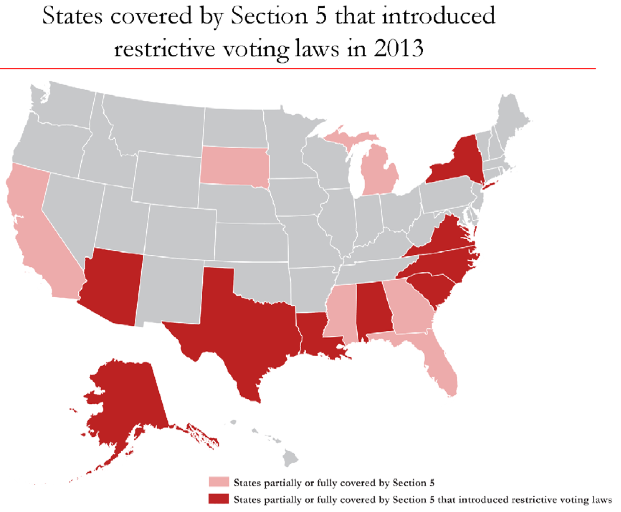What happens if the Supreme Court cuts out the heart of the Voting Rights Act?

Any day now, the U.S. Supreme Court is expected to hand down a ruling in an Alabama case challenging a key provision of the Voting Rights Act of 1965.
Shelby County v. Holder takes aim at Section 5, considered the heart of the civil rights-era law. Section 5 requires the Department of Justice or federal courts to approve any changes to voting laws before they take effect in states and local jurisdictions with a history of voting discrimination -- mostly in the South.
What could come to pass if the high court weakens or strikes down Section 5 is the subject of a new analysis from the Brennan Center for Justice, which filed a friend of the court brief in the Shelby County case defending the provision.
The report, titled "If Section 5 Falls: New Voting Implications," identifies five categories of discriminatory voting changes that the Brennan Center is concerned about:
1. Reenactment of blocked voting changes. States and local jurisdictions could attempt to revive voting changes that have been blocked under Section 5. The number of changes the DOJ has blocked are significant -- 86 in the past 15 years, with 31 of those occurring just since Congress in an overwhelming bipartisan vote reauthorized the Voting Rights Act in 2006. Those blocked changes include a 2003 plan by Bexar County, Texas to eliminate five polling places for early voting that served San Antonio's predominantly Latino West Side, leaving the area with no early voting polling locations. The county failed to secure preclearance for the changes, which the feds consequently blocked -- but which could be brought back to life in the absence of Section 5.
2. Adoption of voting changes that had been deterred by the law. If the high court strikes down Section 5, states and other covered jurisdictions could attempt to move ahead with voting changes that were abandoned or not finally adopted out of concern that they violated the law. One analysis that the Brennan Center points to found that covered states and jurisdictions withdrew 153 voting changes between 1999 and 2005 alone after the DOJ requested more information. And sometimes it doesn't even take the DOJ to discourage discriminatory changes: In 2002, the city council of Fredericksburg, Va. was about to adopt a redistricting plan that would have eliminated its only majority black district, but officials ditched the plan after the city attorney warned that it violated Section 5.
3. Implementation of voting changes that have been enacted but not yet reviewed under Section 5. Voting rights advocates are worried that some jurisdictions have been intentionally dragging their feet on getting preclearance for voting changes in the hopes that Section 5 will be struck down soon. For example, in 2011 the Alabama legislature passed a law requiring voters to show proof of citizenship when registering to vote. After DOJ sent a letter asking for more information, the state withdrew the law from the preclearance process. The state also has not submitted its strict photo ID law for preclearance, leading some legal experts to suspect the state is waiting for a ruling in the Shelby County case.
4. Adoption of new restrictive voting changes. In the run-up to last year's election, 19 states -- most of them in the South -- adopted restrictive new voting laws, including voter ID requirements, early voting limits, and restrictions on registration drives. However, many of these laws -- including ones adopted in Florida, South Carolina, and Texas -- were blocked under Section 5. But if Section 5 is struck down, the Brennan Center worries that states and local jurisdictions may try to implement new restrictive voting laws.
5. Implementation of blocked voting changes that remain on the books. Under Section 5, election changes passed by covered jurisdictions can't be implemented until they get federal approval, but they could remain on the books even though they're not being enforced. For example, a 2009 Mississippi law that imposed majority vote and runoff retirements for county boards of education and some school district boards would have made it harder for racial minorities to elect candidates of their choice. Though the law has been blocked it remains on the books, ready to be put into effect should Section 5 be struck down.
"Section 5 has been an enormously successful took in the fight to eradicate racial discrimination in voting," the report concludes. "If the Shelby County decision eliminates or enfeebles Section 5, there is great cause for concern that the freeness and fairness of elections could be threatened in the immediate aftermath."
Tags
Sue Sturgis
Sue is the former editorial director of Facing South and the Institute for Southern Studies.
